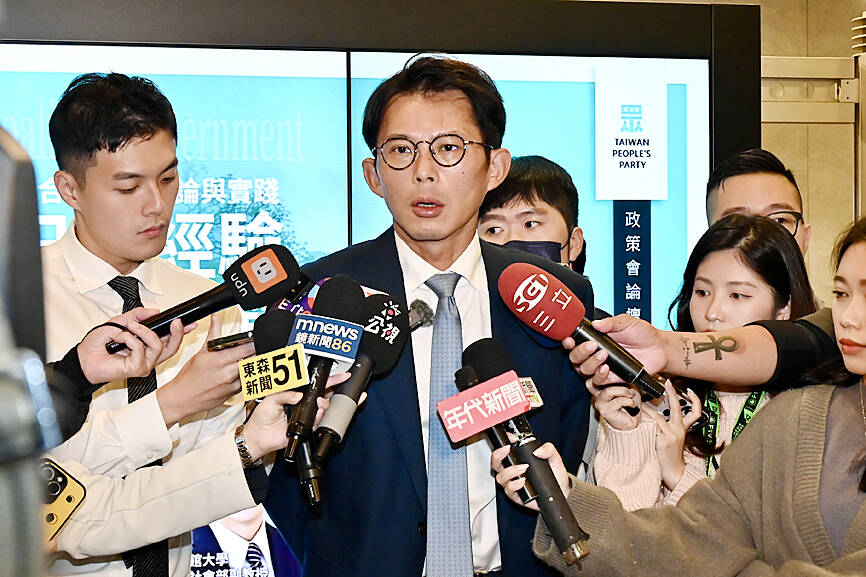Taiwan would likely need to adopt a coalition government model at the local and central levels within the next 10 years, Taiwan People’s Party (TPP) Chairman Huang Kuo-chang (黃國昌) said yesterday.
The TPP held a news conference yesterday morning discussing the possibility of Taiwan adopting a coalition government model, like Japan did recently.
The conference focused on the coalition government formed between Japan’s Liberal Democratic Party (LDP) and the Japan Innovation Party, which helped LDP President Sanae Takaichi secure her spot as Japan’s prime minister, Huang said.

Photo: George Tsorng, Taipei Times
The two parties signed a formal agreement specifying the bills and policies they intend to advance in parliament before Takaichi was elected, he said.
Japan’s example provides insights for Taiwan as it moves toward a coalition government, he added.
At least three forums on local coalition governments are to be held, and Keelung Mayor George Hsieh (謝國樑) and Deputy Mayor Chiu Pei-ling (邱佩玲) have confirmed they would attend, Huang said.
By holding forums in different regions, people would be able to share their experience and discuss the prospect of creating local coalition governments, he said, adding that it would give Taiwanese more chances to get involved.
Huang did not specify which cities and counties might favor a coalition government between the TPP and the Chinese Nationalist Party (KMT), but said that it has broad applications at the local and central levels.
Separately, Democratic Progressive Party (DPP) spokesperson Justin Chuo (卓冠廷) yesterday said that the TPP is using the term “coalition government” to shift concepts and gain political advantages, adding that the central and local governments in Taiwan lack the necessary conditions to implement a coalition government.
A coalition government can only exist in a parliamentary system, in which parties work together to form a majority in the legislature so they can run a stable Cabinet, which naturally leads to alliances between parties, he said.
As Taiwan’s central government operates under a semi-presidential system and local governments run under a mayoral system, coalition governments are inapplicable, Chuo said.

The disruption of 941 flights in and out of Taiwan due to China’s large-scale military exercises was no accident, but rather the result of a “quasi-blockade” used to simulate creating the air and sea routes needed for an amphibious landing, a military expert said. The disruptions occurred on Tuesday and lasted about 10 hours as China conducted live-fire drills in the Taiwan Strait. The Civil Aviation Administration (CAA) said the exercises affected 857 international flights and 84 domestic flights, affecting more than 100,000 travelers. Su Tzu-yun (蘇紫雲), a research fellow at the government-sponsored Institute for National Defense and Security Research, said the air

Trips for more than 100,000 international and domestic air travelers could be disrupted as China launches a military exercise around Taiwan today, Taiwan’s Civil Aviation Administration (CAA) said yesterday. The exercise could affect nearly 900 flights scheduled to enter the Taipei Flight Information Region (FIR) during the exercise window, it added. A notice issued by the Chinese Civil Aviation Administration showed there would be seven temporary zones around the Taiwan Strait which would be used for live-fire exercises, lasting from 8am to 6pm today. All aircraft are prohibited from entering during exercise, it says. Taipei FIR has 14 international air routes and

Taiwan lacks effective and cost-efficient armaments to intercept rockets, making the planned “T-Dome” interception system necessary, two experts said on Tuesday. The concerns were raised after China’s military fired two waves of rockets during live-fire drills around Taiwan on Tuesday, part of two-day exercises code-named “Justice Mission 2025.” The first wave involved 17 rockets launched at 9am from Pingtan in China’s Fujian Province, according to Lieutenant General Hsieh Jih-sheng (謝日升) of the Office of the Deputy Chief of the General Staff for Intelligence at the Ministry of National Defense. Those rockets landed 70 nautical miles (129.6km) northeast of Keelung without flying over Taiwan,

City buses in Taipei and New Taipei City, as well as the Taipei MRT, would on Saturday begin accepting QR code payments from five electronic payment providers, the Taipei Department of Transportation said yesterday. The new option would allow passengers to use the “transportation QR code” feature from EasyWallet, iPass Money, iCash Pay, Jkopay or PXPay Plus. Passengers should open their preferred electronic payment app, select the “transportation code” — not the regular payment code — unlock it, and scan the code at ticket readers or gates, General Planning Division Director-General Liu Kuo-chu (劉國著) said. People should move through the